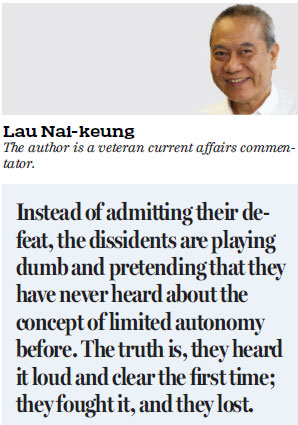Dissidents shocked to find Hong Kong not calling shots alone
Updated: 2017-11-21 06:06
(HK Edition)
|
|||||||||
Lau Nai-keung asks why the question over autonomy and central government jurisdiction, despite having been answered over and over again, is still being asked
I thought nothing was out of the ordinary at the Basic Law forum in Wan Chai last Thursday, and was surprised to read in the news the next day that Beijing has announced in the forum the curbing of Hong Kong's autonomy. "Did anyone say that?" I ask myself, scratching my head.
"Beijing has signaled its impatience at Hong Kong for making no progress in rolling out a controversial national security law, suggesting the city is already paying the price with independence advocates exploiting the lack of such legislation," the South China Morning Post wrote. "Li Fei, a senior mainland Chinese official who specializes in the city's mini-constitution, also made it clear at a Basic Law forum in Wan Chai on Thursday that Beijing would 'jointly govern' Hong Kong with direct control over 'important issues,' while the city's autonomy would be limited to local affairs."
The use of "would" - as in "would 'jointly govern' Hong Kong" - is curious. It implied that before Li's announcement, Beijing was not jointly governing Hong Kong, which is apparently incorrect. I am not sure whether this blatant mistake is intentional or not, but this is Hong Kong politics 101, the SCMP should not have employed people who do not understand this for its politics beat.

The central government has made it clear once and again that our city's authority to govern is derivative. The Basic Law is not laid down by God. It is not a contract between the United Kingdom and China, as those who claim the Basic Law stemmed from the Sino-British Joint Declaration suggest. It is also definitely not a "social contract" between the central government and the residents of Hong Kong. Rather, it is a piece of legislation that was passed by the National People's Congress. As such, the city's authority relies on the will of the Chinese people through the NPC.
These concepts are nothing new. In fact, as early as 2004, Qiao Xiaoyang, then deputy secretary-general of the NPC Standing Committee, made clear in a speech on the Basic Law interpretation that China is a unitary government system and therefore the concept of residual powers was not applicable. During the same speech, he also said the provincial authorities had no power of their own and all the powers were delegated by the central government.
I have copied the summary of Qiao's speech in the paragraph above almost word for word from, guess what, the SCMP!
This is getting tiring. It has always been clear that the NPC gives and it takes away. Hongkongers do not have a birthright to a "highly autonomous" Hong Kong. Some Hongkongers may not like this and they have tried in many different ways to defy the reality. But after the "Occupy" movement and all that, we can see that these radicals have limited influence on the larger society.
What disgusts me is that instead of admitting their defeat, the dissidents are playing dumb and pretending that they have never heard about the concept of limited autonomy before. The truth is, they heard it loud and clear the first time; they fought it, and they lost. By pretending this is new, they thought they could have another chance instigating protests and this time they might be able to win decisively.
A wise man once defined insanity as doing the same thing over and over again and expecting different results. An insane person is worth our sympathy and help, but when he gets into our way and keeps us from functioning normally, we have to put him into a hospital where he can be treated properly.
Last month in Beijing, General Secretary Xi Jinping told the 19th National Congress of the Communist Party of China that the central government's overall jurisdiction over Hong Kong should be combined with the city's high degree of autonomy in an "organic" way.
Some local commentators made fun of the word "organic" because they do not know what the original Chinese word used means in the context, others made meaningless speculations. These are nothing but a reflection of old and unfounded fears. Please stop whining, and look at what is new and what is important in the rapidly changing world - one which China has a leading role in.
(HK Edition 11/21/2017 page8)